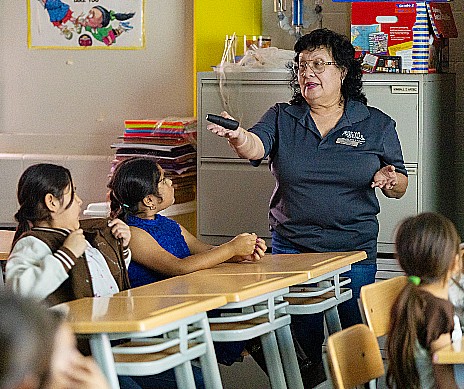Top tips for student mental health when returning to school
AgriLife Extension experts offer essential strategies adults can use to help youth be emotionally resilient

The transition back to school can be exciting but also stressful, so Texas A&M AgriLife Extension Service experts have some essential tips on how adults can help youth navigate this season with confidence and emotional well-being.
“Parents, teachers and caregivers have the greatest influence on a young person’s mindset and attitude, so it is important they model positivity as they try to motivate students,” said Lakshmi Mahadevan, Ph.D., Bryan-College Station, an AgriLife Extension specialist in mental health and well-being in the agency’s Family and Community Health unit.
Tip One: Foster open communication
One of the most valuable things adults can do is create an environment where kids feel comfortable sharing their thoughts and feelings. Often children may be hesitant to talk with parents or other adults about feeling nervous about starting a new school and worrying about how others perceive them and how they are faring socially and academically.
“Talk with your child about their feelings regarding the return to school and find ways to be supportive about their concerns,” Mahadevan said. “Since COVID, many students still feel behind academically or aren’t learning on par with what they did before.”
Because of this, it’s a good idea to check in every few days by asking open-ended questions like, “What was the best part of your day?” or “Is there anything that’s been on your mind lately?”
Mahadevan said listening without judgment and validating their experiences can make a big difference, adding that it is important to be patient, calm and compassionate when trying to get young people to express their feelings.
“It usually takes a while for young people to open up and share more deeply about their emotions and mental health-related concerns,” she said. “If your child senses you are impatient or upset, they will be less likely to share their feelings and concerns in the future.”
Tip two: Promote positive coping strategies
Miquela Smith, AgriLife Extension health program specialist in the agency’s Disaster Assessment and Recovery unit, Lubbock, reaffirmed that feeling anger, frustration and sadness is normal and healthy.
The back-to-school season can bring a mix of excitement and anxiety. A student’s fear of failure, change, socialization or other challenges can sometimes manifest outwardly as cynicism, anger or frustration. However, by understanding the root issues of students’ experiences, Smith said adults can help them cope.
“Accepting and processing emotions as we experience them is key to preventing rumination and festering thoughts in the long run,” Smith said. “Focus on helping students respond, rather than react, to negative emotions.”
She said helping students practice mindfulness will allow them to step back when frustrated or overwhelmed and help them determine the most productive way to respond. By doing this, students can improve their behavior by choosing to replace pessimism with optimism.
Tip three: Develop a healthy outlook

A healthy routine and structure can be incredibly beneficial for mental health, especially during transitional periods like back-to-school season.
Mahadevan explained parents can help their students reduce stress and frustration by ensuring they are organized and helping to create a distraction-free zone where they can focus on schoolwork.
Some additional tips for adults to help students develop a more positive mindset include:
- Openly discuss your own setbacks and how you turned them into growth opportunities.
- Encourage them to learn from failures and remind them failure is a natural part of learning.
- Focus on how effort and persistence contribute to long-term personal growth.
- Support the pursuit of activities they are particularly passionate about.
- Introduce them to simple self-care techniques like deep breathing to help manage stress.
- Help them name and categorize their emotions so they can articulate their feelings more precisely.
Tip four: Encourage self-acceptance and resilience
As a parent, teacher or caregiver, your influence can make a huge difference in a student’s level of self-confidence. Mahadevan said reminders and behaviors that show children you believe in them can help them learn confidence and self-acceptance.
“Ask them to think about and identify specific instances when they exhibited resilience in their daily school life,” she said. “This can help students recognize their strengths and reinforce positive behaviors.”
Mahadevan said some ways to get students to actively engage in self-awareness and self-reflection include asking them to:
- Consider any recent challenges and ask what strategies they used to overcome them.
- Reflect on any recent moments of frustration and what they did to remain calm or motivated.
- Think about a time when they felt like giving up and ask what motivated them to persist.
- Identify something they tried despite being unsure about the possible results and ask how it turned out.
- Visualize how positive self-talk or encouragement helped them when facing a challenge.
Howdy Health is a helpful resource
AgriLife Extension’s Family and Community Health unit helps Texans better their lives through science-based educational programs designed to improve the overall health and wellness of individuals, families and communities.
The agency’s Howdy Health site provides access to science-based mental health education that reduces risk, shows how to build emotional resilience and provides insights on how to develop supportive environments for better mental health.
Additionally, AgriLife Extension has a youth program called Mindful SELF, a six-week series that can be implemented both in and out of classrooms to help middle school-aged students develop socially and emotionally.
Contact your local AgriLife Extension agent to ask about this program and other helpful resources.


